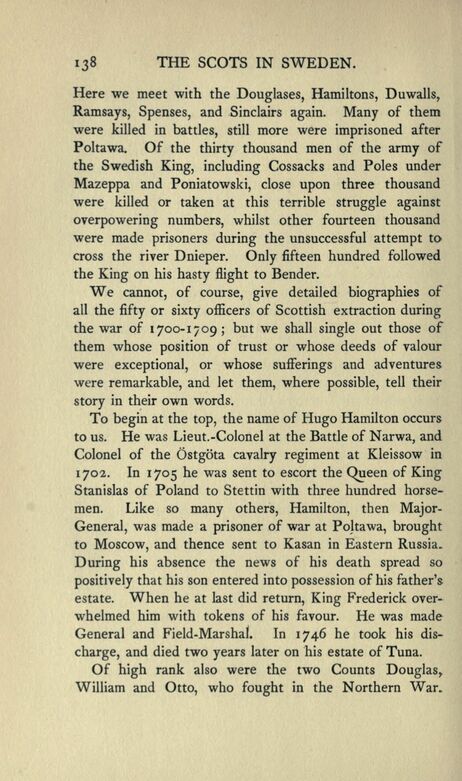
Full resolution (JPEG) - On this page / på denna sida - Sidor ...

<< prev. page << föreg. sida << >> nästa sida >> next page >>
Below is the raw OCR text
from the above scanned image.
Do you see an error? Proofread the page now!
Här nedan syns maskintolkade texten från faksimilbilden ovan.
Ser du något fel? Korrekturläs sidan nu!
This page has never been proofread. / Denna sida har aldrig korrekturlästs.
*3*
Here we meet with the Douglases, Hamiltons, Du walls,
Ramsays, Spenses, and Sinclairs again. Many of them
were killed in battles, still more were imprisoned after
Poltawa. Of the thirty thousand men of the army of
the Swedish King, including Cossacks and Poles under
Mazeppa and Poniatowski, close upon three thousand
were killed or taken at this terrible struggle against
overpowering numbers, whilst other fourteen thousand
were made prisoners during the unsuccessful attempt to
cross the river Dnieper. Only fifteen hundred followed
the King on his hasty flight to Bender.
We cannot, of course, give detailed biographies of
all the fifty or sixty officers of Scottish extraction during
the war of 1700-1709 ; but we shall single out those of
them whose position of trust or whose deeds of valour
were exceptional, or whose sufferings and adventures
were remarkable, and let them, where possible, tell their
story in their own words.
To begin at the top, the name of Hugo Hamilton occurs
to us. He was Lieut.-Colonel at the Battle of Narwa, and
Colonel of the Östgöta cavalry regiment at Kleissow in
1702. In 1705 he was sent to escort the Queen of King
Stanislas of Poland to Stettin with three hundred
horsemen. Like so many others, Hamilton, then
Major-General, was made a prisoner of war at Poltawa, brought
to Moscow, and thence sent to Kasan in Eastern Russia.
During his absence the news of his death spread so
positively that his son entered into possession of his father’s
estate. When he at last did return, King Frederick
overwhelmed him with tokens of his favour. He was made
General and Field-Marshal. In 1746 he took his
discharge, and died two years later on his estate of Tuna.
Of high rank also were the two Counts Douglas,
William and Otto, who fought in the Northern War.
<< prev. page << föreg. sida << >> nästa sida >> next page >>